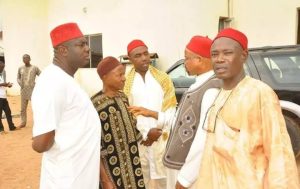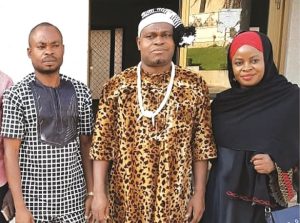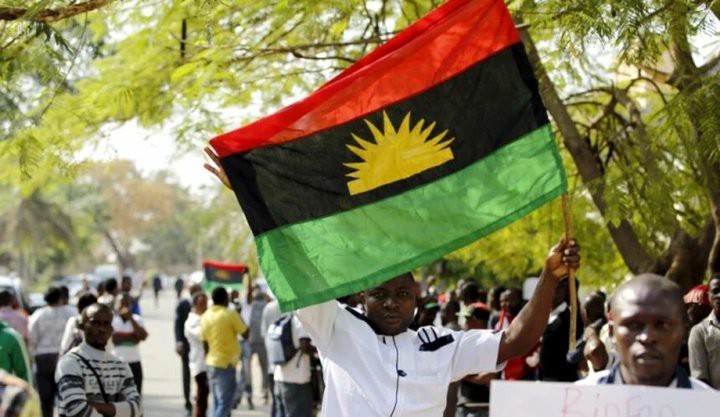Religious tension is once again dominating headlines in Nigeria, this time from a controversial claim surrounding Islam in Biafra territory.
Diaspora Digital Media (DDM), a UK-based company operating in Awka, Anambra State, reports a troubling rise in anti-Muslim rhetoric among some Biafra agitators on social media.
A recent social media uproar centered on statements made in response to a prominent Igbo Muslim on the platform X, formerly known as Twitter.
The Muslim activist, known as Ugwu, found himself at the center of verbal attacks for publicly expressing his faith as an Igbo Muslim.
Several responses to his posts were aggressive, with one user stating, “Biafra will chase every single one of you out to go pray in Kaduna.”
Another user declared, “Islam is banned in Biafra land,” reinforcing the notion of religious exclusion within the Biafra independence discourse.
These comments have prompted widespread concern among Nigerians who believe in religious freedom and national unity.
The claim that Islam is taboo in Biafra land appears to stem from a deep-rooted historical and ideological divide.
The southeastern region of Nigeria, largely dominated by the Igbo ethnic group, is traditionally Christian.
Among Igbos, Roman Catholicism holds a dominant influence, though Anglicanism and Pentecostalism are also widespread.
Historically, the Igbo have expressed resistance to perceived northern domination, which they often associate with Islam and Hausa-Fulani political power.
This resentment has spilled into the ideology of the Indigenous People of Biafra (IPOB), which often portrays Islam as foreign and threatening to Igbo identity.
However, critics argue that this narrative overlooks the religious diversity of the Igbo people and threatens to incite hatred.
Ugwu, one of the few visible Igbo Muslims on social media, has often posted about his experience practicing Islam in a predominantly Christian environment.
His followers include both admirers and critics, but the most recent attacks point to a troubling intolerance within certain pro-Biafra circles.
This intolerance is not officially sanctioned by IPOB, but fringe voices within the movement often dominate the digital narrative.
Statements banning Islam from Biafra land are not supported by any legal framework or constitutional reality in Nigeria.
Nigeria is a secular state, with freedom of religion guaranteed by the constitution.
Nonetheless, the myth of a Biafra free of Muslims has gained traction among some agitators who view Islam as a symbol of oppression.
Such thinking ignores the historical presence of Muslims in the southeast, including Igbo Muslims who have practiced Islam peacefully for decades.
There are communities of Igbo Muslims in states like Enugu, Imo, and Abia, although they remain a minority.
Some of these Muslims converted during interactions with northern traders, or after studying in northern Nigeria or abroad.
The claim that Islam is banned in Biafra land has no legal basis, yet it fuels a divisive narrative that could have dangerous consequences.
Analysts warn that this type of religious rhetoric could escalate tensions in an already volatile political climate.
Human rights activists argue that every Nigerian, regardless of region or religion, deserves protection from hate speech and religious discrimination.
The Nigerian Constitution provides for the freedom of thought, conscience, and religion under Section 38.
This includes the right to change one’s religion and to manifest it in worship, teaching, and observance.
Despite these rights, minority Muslims in the southeast face both overt and subtle discrimination.
Some report being ostracized by their communities or denied participation in family events.
Others fear for their safety when publicly expressing Islamic identity in Igbo-dominated areas.
The rise of social media has amplified both support and hostility toward Igbo Muslims, making digital platforms battlegrounds for ideological supremacy.
Ugwu’s profile on X, where he shares Islamic teachings and personal reflections, has become a flashpoint in this digital conflict.
His attackers often frame Islam as incompatible with Igbo culture, a claim that religious scholars dispute.
Experts point to historical evidence of Islamic influence in parts of the southeast during pre-colonial times.
Islamic missionaries and Hausa traders established communities in parts of Igboland long before the Nigerian civil war.
During the Biafran war (1967–1970), religion played a role in identity politics, but Islam was never legally prohibited in the region.
Instead, religion became another dividing line in the broader political struggle between the North and the Southeast.
Some argue that IPOB’s modern rhetoric weaponizes this historical divide for political gains.
By branding Islam as a northern imposition, IPOB sympathizers rally support among Christian Igbos while alienating their Muslim counterparts.
This strategy may galvanize supporters but risks undermining the values of inclusivity and justice that many Biafrans claim to uphold.
Critics of IPOB’s religious rhetoric say the movement cannot claim to fight marginalization while marginalizing others based on faith.
Igbo Muslims argue that they, too, are victims of national injustice and deserve a voice in the Biafran conversation.
Ayo Obe, a legal expert and civil rights advocate, recently tweeted that religious exclusion is incompatible with any credible self-determination movement.
Biafra, she said, must represent all people within its borders, regardless of faith or background.
Religious leaders across Nigeria have called for unity and tolerance in light of recent developments.
Christian and Muslim clerics alike have condemned the idea that any religion should be banned from a region.
The Sultan of Sokoto, Sa’ad Abubakar, and the Catholic Archbishop of Onitsha, Valerian Okeke, both released statements calling for mutual respect and understanding.
The National Human Rights Commission (NHRC) has also weighed in, warning that hate speech and religious incitement can lead to violence.
Nigeria’s past is riddled with religious conflicts, many of which began with inflammatory speech or marginalization of minority groups.
The threat of another religiously charged conflict cannot be ignored, especially in regions still recovering from past unrest.
Banning a religion is not only unconstitutional but also morally indefensible in a pluralistic society like Nigeria.
Ugwu, the Igbo Muslim at the center of the current controversy, has responded with calm dignity.
In a recent post, he stated, “I am both Igbo and Muslim. That is not a contradiction; it is a fact of my identity.”
His words have resonated with many Nigerians who reject extremism and advocate for peaceful coexistence.
Nonetheless, he continues to receive threats and insults, a reminder of the uphill battle for religious tolerance in certain regions.
DDM encourages all stakeholders, including community leaders, to speak out against hate and foster inclusive dialogue.
Digital platforms must also do more to regulate hate speech and protect users from targeted harassment based on religion.
Civil society groups have a vital role to play in educating communities about Nigeria’s religious diversity and constitutional protections.
Efforts to build a Biafra, or any region of Nigeria, must not ignore the principles of human rights and inclusivity.
Any vision of liberation that excludes people based on their faith is not liberation but a new form of oppression.
As Nigeria continues to wrestle with questions of identity and autonomy, the values of tolerance and coexistence must remain central.
The true test of any freedom movement lies not in the exclusion of others but in the ability to build a society where all belong.









